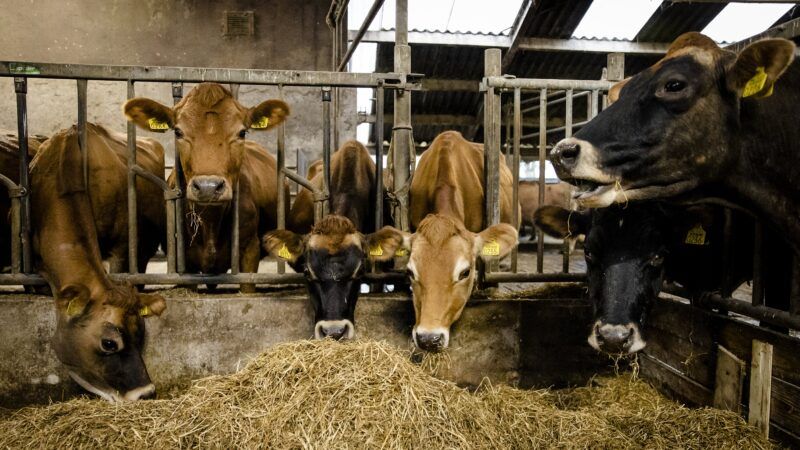E.U. Rules Will Force Dutch To Ban Livestock Farming
A 2019 court ruling has begun to force Dutch farmers out of business—by design.

Dutch livestock farmers are increasingly outraged and bewildered over a court ruling that has begun to force thousands of them out of the business—by design.
In 2019, the High Council of the Netherlands, the country's supreme judicial authority, ruled* that a 2015 system of permitting new nitrogen-emitting projects by requiring nitrogen offsets failed to meet emission limits agreed to by all European Union members. The High Council ruling responded to the verdict in a 2016 lawsuit that Dutch environmental activists filed before the E.U. Court of Justice, in which the plaintiffs claimed that the Netherlands had failed to protect European Union Natura 2000 zones from nitrogen runoff.
The High Council stopped nearly all new construction permitting in the Netherlands–including farm expansions. Since then, Dutch farmers have been locked in a regulatory battle with the Dutch government over whether the country's incredibly dense animal husbandry sector can continue to be the largest meat exporter in the E.U.
The answer appears to be "no."
In June, the Dutch government introduced a plan, costing tens of billions of dollars, to "radically" reduce the number of livestock raised in the country by more than 35 million by 2030. The plan includes "paying some Dutch livestock farmers to relocate or exit the industry, and helping others transition to more extensive (as opposed to intensive) methods of farming, with fewer animals and a bigger area of land."
The plan has sparked "fury" among Dutch farmers, as well as more protests.
"This proud farming nation is under immense pressure to make radical changes to cut harmful emissions, and some farmers fear their livelihoods will be obliterated," the BBC reported this past summer, one of several times Dutch farmers have taken to the streets.
"I am a land owner, so a critical question is whether the government are allowed to push farmers out of the land," dairy farmer and Dutch young farmers' union member Marije Klever told the Guardian in December. "It can't be The Hague telling farmers they must go, you need an agreement."
"It can't be." It shouldn't be. But it is.
Livestock farming and meat consumption are clearly under attack from climate activists. This past autumn, as I detailed in a column, the Dutch city of Haarlem banned meat advertisements to combat climate change. Months later, students at a public university in Scotland voted to prohibit the sale of meat on the school's campus for the same reason. And in a column earlier this month, I highlighted a new study that pushes for the inclusion of climate "warning labels" on foods containing red meat.
A Guardian report this week suggests the same fate ultimately could be in the cards for farmers in the United States as well. "Have we reached 'peak meat,' like peak oil: so much livestock, so much local pollution, that the only sustainable future is in reduction?" the paper wonders. "They're questions the US, the world's largest producer of beef, will also soon have to answer."
However, the Dutch are famous for their agricultural innovation. As The Washington Post noted last year, the Netherlands supplies food to most of Western Europe–both meat and produce–from a land area the size of Maryland. The country's greenhouses can produce vegetables using a fraction of the water needed for outdoor growing operations.
Those greenhouses also use less fertilizer, which leaves chicken, cow, and pig farmers with more manure than they know what to do with. That idle excrement, in turn, has produced an abundance of nitrogen that washes into and alters non-agricultural ecosystems, such as the Natura 2000 zones that E.U. member states have agreed to protect.
Hence, the Netherlands is eschewing its rich history of agricultural innovation to instead reduce the amount of animal husbandry in the country. But why not spend some of the billions set aside to pay Dutch farmers to give up on beef and use it to work with those same farmers to gather, treat, and ship the country's excess manure to Angola, which was briefly a Dutch colony? Angola's fertilizer shortage—of which manure is an effective and natural example—has threatened crop harvests and exacerbated poverty and hunger for millions of people there. People living in other poor countries with fertilizer deficits could benefit, too, if other countries with excess fertilizer (including the United States) took the same approach.
Pollution is a problem. Banning meat is not the answer to those problems.
*CORRECTION: An earlier version of this article mistakenly claimed that the Dutch government's plan to reduce animal husbandry was to reduce methane to comply with a High Council ruling about greenhouse gas emissions. The article text has been updated throughout to clarify that the 2019 ruling in question concerned excessive nitrogen levels in and around European Union Natura 2000 zones.

Show Comments (303)